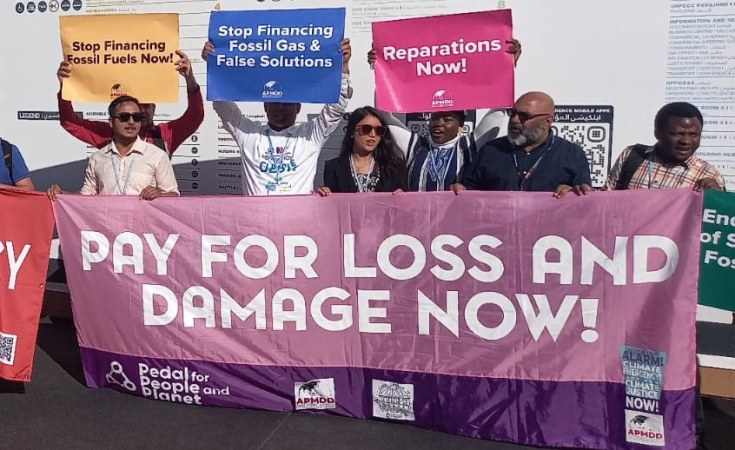Fossil fuels, by far the biggest source of emissions, have brought much harm and few benefits to Africa. Yet climate agreements barely mention them.
From 4-6 September, the Kenyan government will co-host the Africa Climate Summit (ACS) with the African Union Commission. The conference will bring together a wide range of actors to strategise climate interventions. Its outcomes will help shape discussions around energy development, climate finance, and adaption in Africa ahead of the COP28 summit.
The first of its kind, the Nairobi summit provides African leaders and its people an opportunity to unite around a common pan-African agenda - one that brings justice and prosperity to a continent that suffers disproportionately from the impacts of a climate crisis to which it has contributed very little. The event presents a chance to forge consensus. At international climate conventions such as the COP, African leaders have typically shown up with scattered and poorly aligned positions, leaving them open to external influences and pathways that do not work for African people.
In coming to this common position, the Africa Climate Summit ought to prioritise discussions addressing the legacy of fossil fuels on the continent. This inheritance is marred by a plethora of injustices including colonialism, energy apartheid, a distortion of African economies to single commodity-based economies, and the pollution of food and water systems.
Take Nigeria. In Africa's biggest oil producer, extraction has made the Niger Delta one of the most polluted regions in the world as huge spills have poisoned the waters, destroyed vegetation, and made farmland infertile. Furthermore, despite having produced billions of barrels of oil over five decades, 40% of the country's 200 million people still lack access to electricity.
As well as experiencing the fewest benefits from the production of fossil fuels, African countries also feel the worst effects of their burning. Earlier this year, for example, Malawi, Mozambique, and Zimbabwe were devastated by the longest and most powerful cyclone ever recorded. In the Horn of Africa meanwhile, 60 million people are facing a humanitarian crisis amid the worst drought in decades. As climate change deepens, the continent will be disproportionately badly hit.
Yet despite all these impacts and the warnings from scientists that fossil fuel extraction is incompatible with emissions targets, countries continue to skirt around discussions on ending them. Fossil fuels were only even mentioned for the first time in a COP decision in 2021, and the COP27 agreement last year failed to call for a reduction of by far the biggest source of global greenhouse gas emissions.
Instead, leaders seem to feel more comfortable entertaining false and foolish solutions such as carbon markets. One of the two "cross-cutting levers" shaping the Africa Climate Summit's agenda, for instance, is "climate finance and carbon credits". Carbon markets have been sold as a win-win for companies and the climate, but the reality is that they allow polluters to continue to emit and maintain the status quo.
The legacy of fossil fuels has also allowed rich nations a foothold in Africa's affairs. The same dynamic that applied when colonisers mapped the continent in terms of its natural reserves continues today, such as in the form of the recent "dash for gas" in Africa. This impulse - prompted by European countries' anxiety due to the war in Ukraine - will result in massive pipelines burrowing through African communities and land in order to transport resources out of Africa and onto wealthy nations. Gas in Africa is not being developed to bring energy and prosperity to the continent but to meet rich nations' energy demands and sustain their economic systems.
And yet, Africa urgently needs energy. The continent has the highest energy poverty in the world, with an estimated 600 million people without access to electricity. Powering the continent will require much more than a simple shift to clean energies. It will take a radical transformation of existing energy systems, including the architectures that underpin them, from global finance to trade to the politics around energy and development. This too should be at the centre of the agenda at the Africa Climate Summit.
Rather than accepting the death sentence of further fossil fuel extraction or a similarly devastating business-as-usual scenario that a focus on false solutions allows, discussions around climate in Africa should address the structural and systemic failures that have kept Africa energy poor, seen vast resources mined from the continent to the detriment of its people, and concentrated wealth and power in the hands of elites.
The issue of justice should be at the centre of all these climate talks. The climate debt should be paid. Relief should be provided for communities bearing the brunt of climate disasters. And climate finance must be availed to poorer nations.
The Africa Climate Summit should be the opportunity for African people to coalesce around such a common Pan-African agenda that does away with fossil fuels and its unjust legacy, while laying the groundwork to build resilient and sovereign energy systems that are compatible with our environment. Artificial and superficial solutions will not help tackle climate change or bring climate justice to Africa and its people.
Lorraine Chiponda is a facilitator of the Don't Gas Africa campaign.


